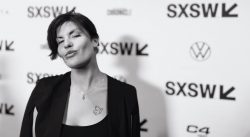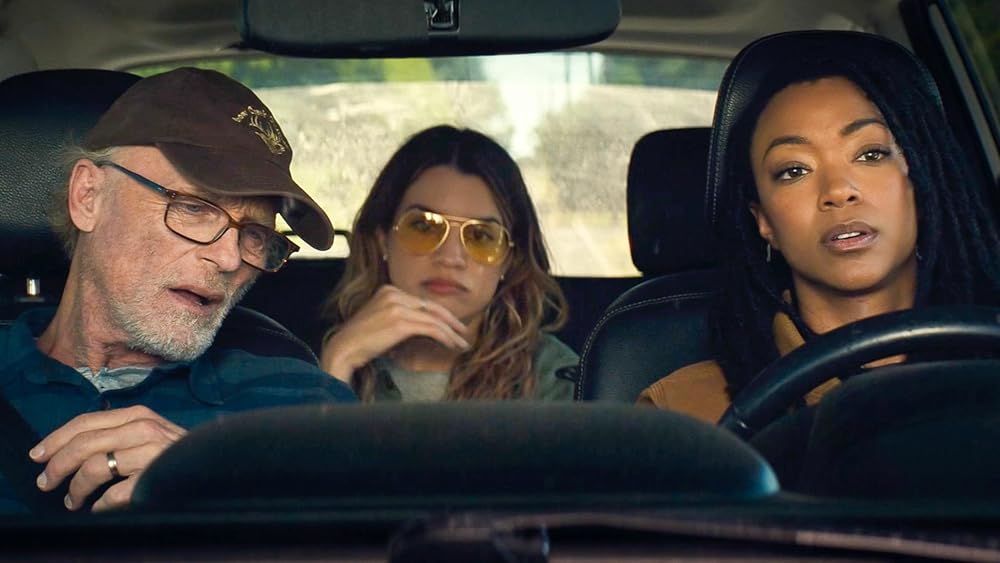Screenwriter AJ Bermudez is going from strength to strength in her screenwriting career. Featured in Deadline, her new dreamed project My Dead Friend Zoe premiered at SXSW in 2024 and having a theatrical release in February 2025. The film stars Sonequa Martin-Green as Merit, Natalie Morales as Zoe, Ed Harris, Morgan Freeman, Utkarsh Ambudkar, and Gloria Reuben. We first caught up with her in 2019 and revisiting her to discuss her career trajectory over the last few years.
You first got on our radar with Nightingale a few years ago. Now you’re back with My Dead Friend Zoe. How have you navigated your career with strategic choices?
I think the most important thing in this industry (or probably outside it) is to work with cool people. Not cool as in sleeve tats (although that’s sometimes part of it), but people who are genuinely kind, smart, and collaborative. Strategically, I’ve said no to some big things that would have paid the rent, but made me miserable, or that I didn’t believe in.
Connecting the dots from Nightingale a bit, I was discussing that project on the podcast Making Movies Is Hard, and one of the hosts, Liz Manashil (who’s also very into only working with cool people) suggested I meet director Kyle Hausmann-Stokes, who was looking for a screenwriter to collaborate with on My Dead Friend Zoe. Kyle turned out to be about the coolest person one could hope to work with, and that’s how it was throughout the process: an amazing crew, a phenomenal cast––basically just cool people all the way down.
Career-wise, another big thing for me strategically has been diversification. I published my first book, Stories No One Hopes Are About Them, in 2022; I have a new book underway; and I’m working as a visiting professor at the University of Miami this year. And this isn’t just because I love having a ton of irons in the fire (although I do), but because all these things feed each other––working across disciplines, engaging with others’ work, and experimenting in different artistic arenas keeps me sharp (and busy).
What have you learned about storytelling and filmmaking over the past 5 years?
The biggest thing I’ve learned about storytelling––and this certainly applies to filmmaking––is that community is at the core. There’s this myth that the writing process is solitary––and that can definitely be true––but in screenwriting, you’re really building a communal experience. You’re constructing a playground that other people will get to play on. Not to push the metaphor too hard, but you want people on your playground who are going to participate generously and imaginatively, who are here to build and to play, not who are here to kick down sand castles or hog the slide. Which goes back to the cool-folx-only rule.
What were your biggest misconceptions about the script to screen process?
I got my start in playwriting, so when I was hired to solo-write my first feature-length film in 2018, I definitely came with some misconceptions about creative control. (This was years before I latched onto the playground analogy). In theater, writers tend to have a lot of creative control; in film, generally considerably less.
But I came to understand that, as long as everyone’s committed to bringing the project to its best possible iteration, this lack of control is a strength. And I’ve come to love the pressure of the filmmaking process, what it can do to the writing––for example, if the venue suddenly changes, if we’re losing daylight in two hours, whatever happens… it’s on.

AJ Bermudez
How did you pitch My Dead Friend Zoe to cast, crew and investors?
Kyle [the director] is a genius at this. One thing we’ve often talked about is the value of connecting a great story––something original, impactful, and effective on the macro level––to something that’s also intimate, honest, and compelling on the micro level. Kyle really understands this deeply, and I think that’s a major reason we were able to get such tremendous individuals involved with the project.
How did you get them attached? What was the most challenging aspect?
I’d be remiss not to say that having a killer script is step one. From the outset, it was important to convey a clear vision, including the tone and sense of imaginative-but-realizable material on the page. And excellent people are often in-demand people, so a major challenge––although this is not a sexy answer––is coordinating schedules. Thankfully, as a screenwriter, most of that is above my pay grade.
Describe what happened after the film was produced in terms of getting it out there. How are audiences responding to it?
It’s been really inspiring to connect with audience members after screenings, to hear how they resonate with the story. This is a film in which many individuals––whether through avenues of relationship, experience in or post-war, through joy and loss––see themselves. And we’ve been fortunate to score some wins, including at SXSW, Woodstock, and Mill Valley. I’m excited for the release in February 2025.
How are you leveraging this in terms of your career?
To be honest, I’m not doing much leveraging at the moment, partly because I’m a natural introvert and partly because of the calm-before-the-storm timing (in a good way). I’m a believer in seasons of hustle and seasons of creative work, and right now I’m really focused on the latter.
Would you have done anything differently?
Nothing comes to mind. Actually, I take that back––I’d probably try to find a way to shoehorn in one more Morgan Freeman scene.
[More: Amanda Bermudez On Nightingale]
How would you brand yourself as a filmmaker?
It’s funny, when you asked me this five years ago, I said that I “gravitate toward dark, playful thrillers with an intellectual edge.” And that’s still true, but I’m leaning more toward playfulness these days. My Dead Friend Zoe is a good example of this: it’s definitely a dark comedy––and it gets pretty dark––but it’s a comedy.
And it’s built for a massive audience; wherever you’re coming from, you can enjoy this film. I’ll add that I love big films (I’m working on a new action-rom-com at the moment), especially films in multiple genres. Ultimately, I guess my “brand” reflects my belief that films can be entertaining, edifying, and empowering all at once.
What advice do you have for screenwriters who have yet to produce their first film?
Don’t give up, but also do other things. Go play outside. Go to a museum. Take up poetry or drums or an obscure subgenre of baking. Do things you love that are not screenwriting, not only because it’ll make your work better, but because it’ll make you better. And don’t attach yourself to projects you don’t love. Never do something just for the money––focus on projects that matter to you, that you’ll be proud of, and that you’ll enjoy along the way. As a screenwriter, so much is outside of your control with regard to prospects for production, but if you love something, you’ll be thankful you did it no matter what happens.
